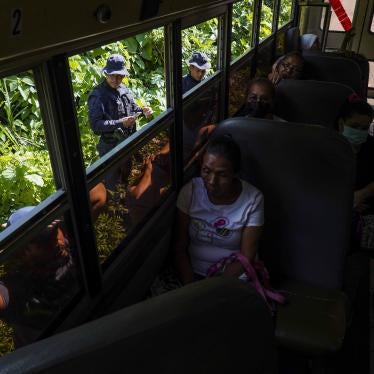(Washington D.C.) - The Peruvian government must take immediate steps to protect a threatened witness in a key torture prosecution, Human Rights Watch said today.
Luis Alberto Ramírez Hinostroza has been a critical witness on military torture in the 1990s for Peru's Truth and Reconciliation Commission and for local prosecutors. On August 30, he was shot in the street close to his home in Huancayo, at about 8:30 p.m., by a man and a woman he described as having a military bearing. The two had gotten out of a black car, which sped off after the shooting. Ramírez was taken to hospital, given emergency surgery, and is now recovering from a bullet wound in the stomach.
"Those who risk their lives to denounce human rights violations deserve protection from the state," said José Miguel Vivanco, executive director of the Americas Division of Human Rights Watch. "The government has failed miserably in its duty to protect Ramírez Hinostroza; it must take immediate steps to protect him in the future."
In 1991, Ramírez, then 17, was held in unacknowledged detention in a military barracks in Huancayo, where he and several others held with him were tortured. According to reports, a soldier at the barracks disobeyed orders to keep quiet and told Ramírez's parents that he was being held there and had been severely tortured.
Ramírez later testified about his experience to the Peruvian Truth and Reconciliation Commission. The commission reported last year on the grave human rights and humanitarian law violations committed during Peru's internal armed conflict (1982-2000).
Ramírez also testified about his case to a local prosecutor investigating torture, "disappearances" and extrajudicial executions committed during this period. One of those charged with his torture is Gen (Rt.) Luis Pérez Documet, a former military chief of Junín province. Pérez Documet is charged with the "disappearance" of nine other people who were held with Ramírez in the same barracks.
A key witness in the case, Ramírez has suffered other attempts on his life and death threats this year. On March 13, he escaped unhurt when four individuals chased him down the street and fired rifles at him. In July he received death threats at his home. During a police inspection of the barracks where he was tortured, some soldiers photographed Ramírez and threatened to arrest him.
According to Peruvian human rights lawyers, two days before the August 30 attack, Ramírez noticed he was being followed, managed to shake off his tail, and went to the Huancayo prosecutor's office to seek help. He was told the official he requested was unavailable, and he had to leave without a police guard.
Concerned about Ramírez's safety, on August 2, the Inter-America Commission on Human Rights requested the Peruvian government to institute special measures for his protection. Before the attack, he had received official papers saying that his request for "personal guarantees" had been granted, but no physical assistance was provided. The lawyers report that two policemen are now guarding him in the hospital, but the government has yet to pledge that it will provide him with bodyguards in the future.
Now age 30, Ramírez still bears scars from his torture on his hands, arms, back, and legs. From his hospital bed he told a reporter from the Lima newspaper El Comercio, "I'll stick to the statement I made to the Truth Commission."






